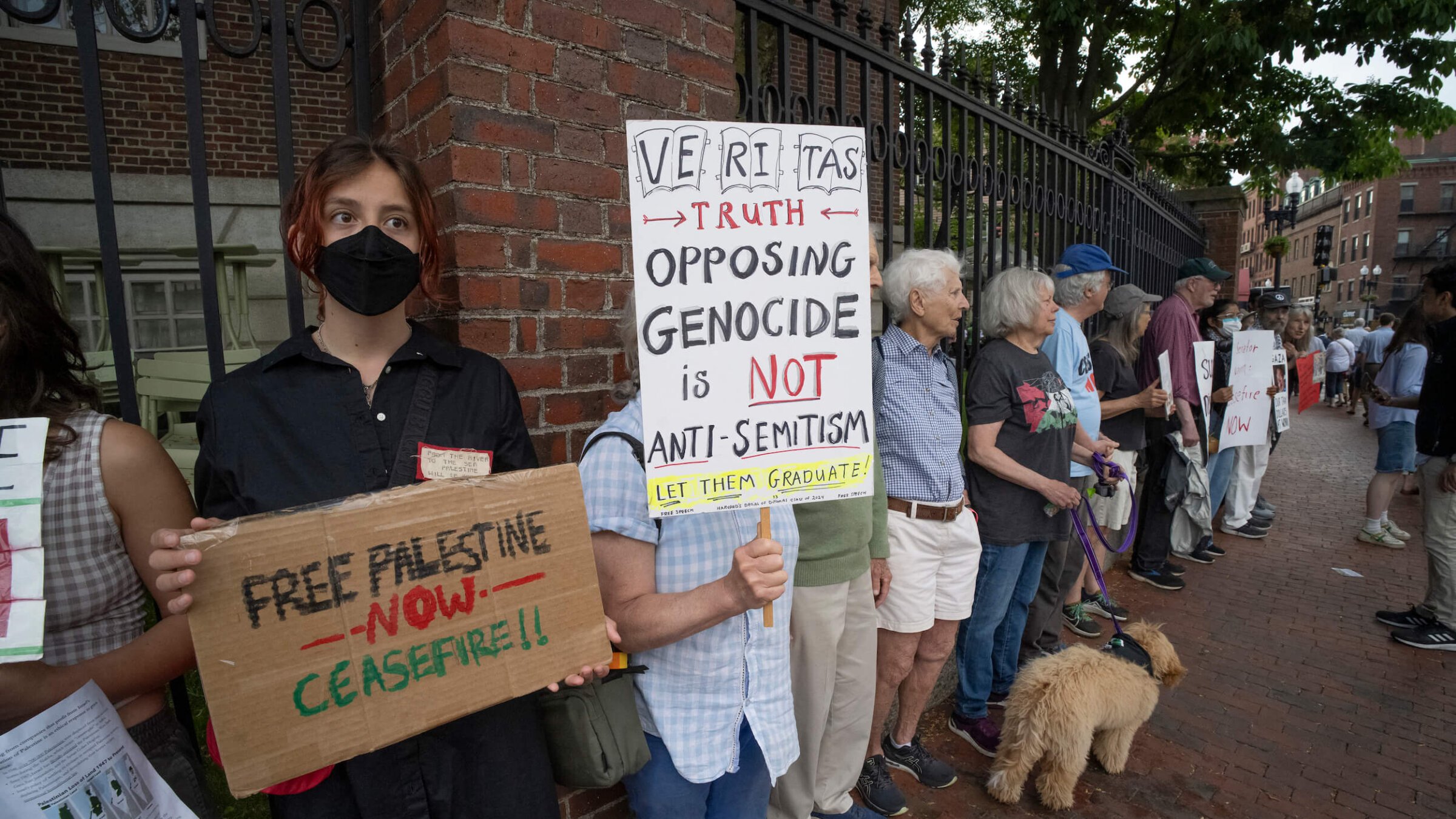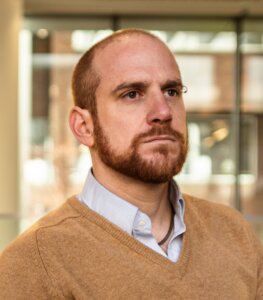In Trump’s war against campus antisemitism, hate the tactics but don’t ignore the problem
Antisemitism on campus has spiked since Oct. 7 — and no, it’s not just anti-Zionism

Pro-Palestinian demonstrators protest outside Harvard Yard during Harvard University’s class of 2024 graduation ceremony in Cambridge, Massachusetts, on May 23, 2024. Photo by Rick Friedman/AFP/Getty Images
There are good reasons to critique President Donald Trump’s crackdown on universities as part of a purported effort to fight antisemitism. But too many have taken that critique too far, and dismissed concerns about a spike in campus antisemitism as nothing more than a partisan maneuver. Jewish students have legitimate, data-supported fears in this domain — ones that we ignore at our peril.
“The large-scale characterization of American campuses as antisemitic strikes me as an exercise of gaslighting by the Trump camp,” Mathias Risse, a professor at Harvard’s Kennedy School, argued in a recent essay. While antisemitism certainly exists, he wrote, the narrative that campuses have become broadly hostile environments for Jews is overstated, in part because he thinks that much of what is labeled antisemitic is principled opposition to Israeli policy or Zionism itself.
That’s a thoughtful position — it is true that the boundaries between anti-Zionism and antisemitism have been confused since the Hamas attack of Oct. 7, 2023 — and one that many in academia may find reassuring. But when placed alongside the lived experience of Jewish students and the empirical data available, it becomes clear that this framework overlooks a deeper, more troubling reality: Antisemitism is everywhere and, in fact, increasingly visible among young people.
The idea that academia is a bastion of moral clarity, and that society’s gravest prejudices — racism, homophobia, antisemitism — reside exclusively on the political right, well outside of the academic mainstream, remains a persistent blind spot within institutions of higher education. (Risse, in his essay, points to the far right as the true locus of antisemitic ideology and cautions against conflating criticism of Israel with hatred of Jews.)
Risse cites a March 2024 study from the University of Chicago to support his case, arguing that it shows students are largely capable of distinguishing between hatred of Jews and criticisms of Israel, and that they are not more antisemitic than the general population, but rather more anti-Zionist. However, a closer reading of that same study reveals disturbing realities.
Foremost among them: 66% of Jewish students interpret the ubiquitous chant “From the river to the sea, Palestine will be free” as advocating for the replacement of Israelis — even through expulsion or genocide. Only 26% of non-Jewish students share this interpretation. On most campuses, we defer to marginalized communities to define their own experiences of hate. Why are Jewish students uniquely denied this right? If Jewish students understand a popular protest chant to be a call for violence toward Jews, why are we so eager to dismiss that response?
A February 2024 Anti-Defamation League survey found that younger Americans are now more likely to endorse antisemitic tropes, and that people with anti-Israel beliefs are far more likely to be anti-Jewish. A recent Blue Rose poll among registered voters revealed that 18-year-olds are more than five times more likely to view Jews unfavorably than 65-year-olds, with no significant partisan gap. Even more troublingly, the same Chicago study that Risse cited found that students with anti-Zionist views were twice as likely as others to justify Hamas’ Oct. 7 attack — the deadliest single day for Jews since the Holocaust.
The data is clear: The idea that younger Americans are simply anti-Zionist, not antisemitic, doesn’t hold up.
The debate over how to criticize Israel without veering into antisemitism is hardly new. Jews around the world regularly criticize the Israeli government. In fact, no one protests Israeli policies more than Israelis themselves. But Jews who take issue with Israel also instinctually understand the critical boundary between legitimate political critique and rhetoric that slips into antisemitic territory — a boundary that, unfortunately, many college students do not recognize or respect.
According to the International Holocaust Remembrance Alliance definition of antisemitism — which has been adopted by Harvard, where Risse teaches — “holding Jews collectively responsible for actions of the state of Israel” is a form of antisemitism. Yet the Chicago study reveals that students with strong anti-Zionist views are more than twice as likely to blame American Jews for violence in Israel and Gaza. 26% of them take that attitude, compared to 12% among those with low levels of anti-Zionism.
This isn’t about shielding Israel from critique. It’s about accepting the clear truth that criticism of Israel can cross into antisemitism.
An August 2024 Brandeis University survey found similar patterns. Among students with strong anti-Israel views, 83% said they would not be friends with someone who supports Israel’s existence as a Jewish state. Across the general student population, 25% said the same. Given that the overwhelming majority of young Jews support Israel’s existence, this amounts to social exclusion of Jews because of their identity.
Even more starkly, 61% of students with strong anti-Israel views reported holding unfavorable opinions of Israelis as a people — not just the government. In contrast, 51% of Jewish students said they don’t support the Israeli government, but only 10% expressed unfavorable views of Israelis.
Jewish students appear capable of distinguishing between a government and its citizens. Why isn’t the same standard expected from their non-Jewish peers?
When activism leads to social exclusion of Jews, hatred of Israelis, and justification of terrorism, it cannot simply be brushed aside as principled dissent.
From my own experience in academia — I am a researcher at Harvard’s Kennedy School, the same institution where Risse works — I have seen that many within academia fail to recognize how anti-Zionism often functions as its own conspiratorial framework. Where earlier generations blamed Jews for controlling banks, today’s version insists that “Zionists control Congress” or that “Israel is the reason you don’t have healthcare.” The vocabulary has changed. The logic has not.
To be clear, none of this implies that all criticism of Israel is antisemitic, or that Palestinian advocacy should be suppressed. Robust debate is essential on campuses. But when demonstrations celebrate violence; support the idea of an intifada; or employ antisemitic tropes under the guise of anti-colonialism, universities cannot remain silent.
New York Times columnist Bret Stephens said last week, of Trump’s war on antisemitism, that “we should not have to forsake our liberalism to fight this battle.” Nor should we choose between confronting hate and preserving free expression. Both are possible — and necessary.
Jewish students deserve clarity and safety. They deserve the dignity of defining their own experiences without being told their perceptions are invalid. Ultimately, Jewish students know what antisemitism looks like — and they should no longer tolerate being told it doesn’t exist.















